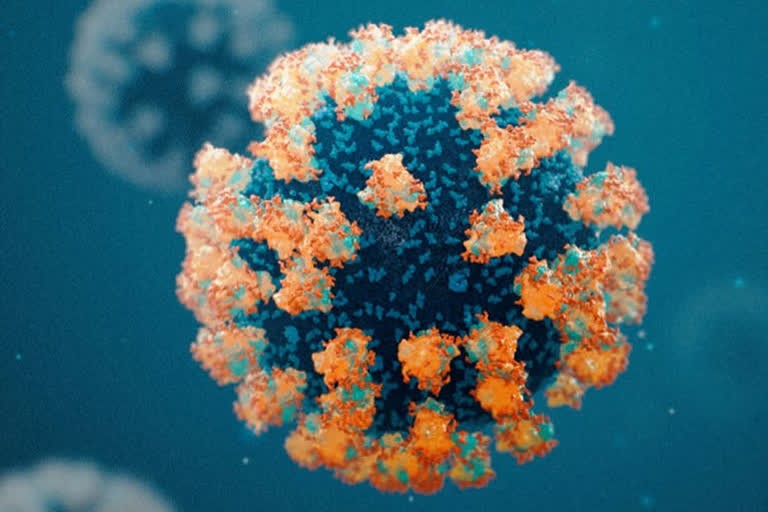New Delhi: Viju Vijyan, 32 and his father V Vijyan, 70 were admitted to a Noida hospital after their oxygen saturation level dropped. Their family members were waiting for their safe return from the hospital. But, it turned out to be the last journey for both father and son duo as they died after spending a few days in the hospital. Similarly, Sushil Sharma, 36, died and left behind his two minor kids and wife after struggling for his life at a Noida hospital.
A similar situation happened with many families at a residential complex "Nirala Estate" in Greater Noida in Uttar Pradesh, where more than 11 people have died in the last 10-14 days. Such heartbreaking stories keep pouring in from across India as the country has been witnessing the havoc created by the second wave of Covid-19. Data suggests that the second wave of Covid-19 is proving to be more infectious and deadlier in some states, although India's death rate from the virus is still comparatively lower than in other countries.
Scientists at India's apex medical research institute, the Indian Council of Medical Research (ICMR) told ETV Bharat that a greater number of people are getting infected due to the rapid spread of the virus. "It's not that the current surge and deaths are happening due to the foreign variants. There are multiple reasons which are leading to the present situation," said Dr Lokesh, spokesperson in the ICMR.
Also Read: Delhi govt steps up efforts for smooth vaccination drive
Aware of the present situation, the Union Home Ministry on Thursday asked states and UTs to take intensive local containment measures. The Home Ministry has also suggested for implementation of community containment and large containment areas across the states and UTs where the tests positivity rate is more than 10 per cent in the last one week and where bed occupancy is more than 60 per cent.
Experts say that the present situation is tough to control as it's crumbling the country's healthcare system. The ICMR spokesperson, however, believes that the present spike in Covid cases will come down in the next 4-6 weeks. "Hopefully within the next 4-6 weeks, India will see a decrease in the current spike of Covid-19 cases," said Dr Lokesh.
The rise in the number of cases has been exponential in the second wave. On June 18 last year, India recorded 11,000 cases and in the next 60 days, it added 35,000 new cases on average every day. On February 10, at the start of the second wave, India confirmed 11,000 cases and in the next 50 days, the daily average was around 22,000 cases. Ironically, in the following 10 days, cases rose alarmingly with the daily average reaching almost 90,000.
"The present wave is more infectious and deadly. The current mutation is attacking the lungs directly causing maximum deaths," said Dr Giridhar Gyani, director general of Association of Health Care Providers India to ETV Bharat.
In addition to the rapid spread of infection, the three foreign and one Indian double mutants are creating the current havoc across the country. The virus variants of Brazil, UK and South African have been detected in India.
"The recently held elections and several public gathering have further aggravated the situation," Dr Gyani said. "The present situation has crumbled the Indian health infrastructure. Lack of Genome sequencing is also aggravating the situation," added Dr Gyani.
Earlier, this year, the central government had set up a consortium for sequencing the mutation. Dr Gyani has said that the central government should have given more emphasis on vaccine manufacture. "By injecting more funds, the vaccine manufacturing process could have been expedited," said Dr Gyani.
The statement given by Dr Gyani assumes much more significance following the fact that many of the state governments have expressed their inability to start vaccination for all above 18 years of age from May 1. By further relaxing the age criteria, the central government has recently announced that people above 18 years of age should be vaccinated.
Also Read: Have you considered compulsory licensing of Covid vaccines under Patents Act: SC to Centre
Other reasons for the deteriorating present situation is the shortage of beds and the supply of oxygen in hospitals. Many cities across India have reported an acute shortage of hospital beds. Many state governments said that they are creating new facilities to accommodate the positive patients. Experts, however, said that it might be hard to keep up with the pace of the rising number of infections.
Several people have reportedly died in the last few days due to the non-availability of oxygen on time. Significantly, major cities like Delhi, Mumbai, Ahmedabad among others have almost run out of hospital beds. Many cities are also left with a few ICU beds.
Central government statistics revealed that on Friday India recorded a daily rise of over 3.86 lakh new Covid19 cases with over 3,000 deaths for the third consecutive day. With 386,452 new cases recorded on Friday, India's tally of Covid-19 cases now stands at 1,87,62,976, the highest since the pandemic started in 2019.
In the last 24 hours, India registered 3,498 deaths from across the country. With 771, Maharastra registered the highest death in the last 24 hours followed by Delhi 395 and Uttar Pradesh 295.
Also Read: Delhi govt urges Centre to raise city's daily quota of medical oxygen




